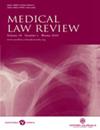‘My Advocacy is Not About Me, My Advocacy is About Canadians’: A Qualitative Study of how Caregivers and Patients Influence Regulation of Medical Assistance in Dying in Canada
IF 1.7
4区 医学
Q1 LAW
引用次数: 0
Abstract
Medical assistance in dying (MAiD) was legalised federally in Canada after the Supreme Court decision in Carter v Canada (Attorney General) [2015] 1 SCR 331. The federal legislative framework for MAiD was established via Bill C-14 in 2016. Caregivers and patients were central to Carter and subsequent litigation and advocacy, which resulted in amendments to the law via Bill C-7 in 2021. Research has primarily focused on the impacts of regulation on caregivers and patients. This qualitative study investigates how caregivers and patients influence law reform and the operation of MAiD practice in Canada (ie, behave as ‘regulatory actors’), using Black’s definition of regulation. We found that caregivers and patients performed sustained, focused, and intentional actions that influenced law reform and the operation of MAiD in practice. Caregivers and patients are not passive objects of Canadian MAiD regulation, and their role in influencing regulation (eg, law reform and MAiD practice) should be supported where this is desired by the person. However, recognising the burdens of engaging in regulatory action to address barriers to accessing MAiD or to quality care, and MAiD system gaps, other regulatory actors (eg, governments) should minimise this burden, particularly where a person engages in regulatory action reluctantly.我的主张与我无关,我的主张与加拿大人有关":关于护理者和患者如何影响加拿大临终医疗协助监管的定性研究
在最高法院对 "卡特诉加拿大(总检察长)案"[2015] 1 SCR 331 做出判决后,加拿大联邦将临终医疗协助(MAiD)合法化。2016年,通过C-14法案确立了MAiD的联邦立法框架。护理者和患者在卡特案以及随后的诉讼和宣传中发挥了核心作用,最终于 2021 年通过 C-7 法案对法律进行了修订。研究主要集中于法规对护理者和患者的影响。本定性研究采用布莱克对监管的定义,调查护理者和患者如何影响加拿大的法律改革和MAiD实践的运作(即作为 "监管行为者 "的行为)。我们发现,护理人员和患者采取了持续、集中和有意的行动,这些行动影响了法律改革和千年发展目标的实践运作。照护者和患者并不是加拿大多元医疗实践监管的被动对象,他们在影响监管(如法律改革和多元医疗实践)方面的作用应该得到支持,只要他们希望这样做。然而,认识到参与监管行动以解决获得人工辅助器具或优质护理的障碍以及人工辅助器具系统差距所带来的负担,其他监管行为者(如政府)应尽量减少这种负担,特别是在个人不情愿参与监管行动的情况下。
本文章由计算机程序翻译,如有差异,请以英文原文为准。
求助全文
约1分钟内获得全文
求助全文
来源期刊

Medical Law Review
MEDICAL ETHICS-
CiteScore
3.10
自引率
11.80%
发文量
50
审稿时长
>12 weeks
期刊介绍:
The Medical Law Review is established as an authoritative source of reference for academics, lawyers, legal and medical practitioners, law students, and anyone interested in healthcare and the law.
The journal presents articles of international interest which provide thorough analyses and comment on the wide range of topical issues that are fundamental to this expanding area of law. In addition, commentary sections provide in depth explorations of topical aspects of the field.
 求助内容:
求助内容: 应助结果提醒方式:
应助结果提醒方式:


